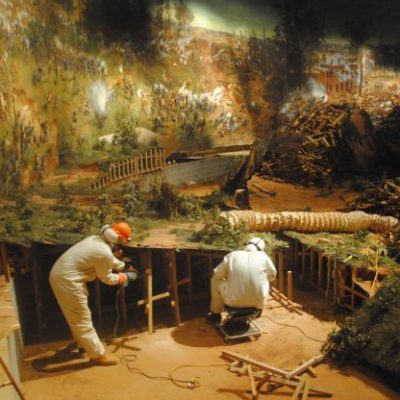British history includes some feisty queens – Boudicca of the Iceni in East Anglia, Elizabeth I of England, Queen-Empress Victoria of Great Britain and a hefty chunk of the rest of the world. Less well known are the three unsung German princesses who in the 18th century arrived at London’s Hanoverian court, threw themselves into British culture and did nothing short of creating the blueprint for our monarchy today.
The title of a new exhibition dedicated to these women is daring: ‘Enlightened Princesses: Caroline, Augusta, Charlotte, and the Shaping of the Modern World.’ Can this possibly have been the case? In some ways, yes. Britain had just seen the rise of parliamentary government through various events from the beheading of Charles I to the Glorious Revolution, ending with the 1701 Act of Settlement which barred anyone who was Catholic or married to a Catholic from the English throne. So it was that the grand Catholic Stuart line lost out to the minor Protestant Hanoverians. On its arrival in 1714, George I’s court had little reason for existing apart from being Protestant. They knew they were skating on thin – and foreign – ice.
Queen Caroline of Ansbach (c. 1735), Joseph Highmore. Royal Collection Trust, UK, © Her Majesty Queen Elizabeth II 2016

The three princesses at the heart of this new court came from minor principalities and were not worldly – which was perhaps the key to their success. Caroline of Ansbach (1638–1737) would become queen to George II (r. 1727–60). Augusta of Saxe-Gotha (1719–72) was never queen but prepared her son to assume power as George III in 1760 aged just 22: he reigned for 59 years despite his later insanity. Finally, Charlotte of Mecklenberg-Strelitz (1744–1818) was queen to George III; her granddaughter would be Queen Victoria.
Joanna Marschner, senior curator at Historic Royal Palaces (HRP) and lead curator of this exhibition, spent some five years researching her subjects. Her findings are intriguing. ‘The take-away from this show’, says Marschner, ‘is that during the 18th century three generations of extraordinary foreign women, who married into the British royal family, made a contribution to Britain that has rarely been touched on. We’ve pulled it out for inspection.’ Embracing traditional British culture and the dynamic Enlightenment in Scotland and England, newly united since 1707 to create Great Britain, the princesses added German Enlightenment ideas to create a new cultural identity for the British monarchy – which is still Hanoverian in its origins despite the politically expedient name-change to Windsor in 1917.
‘None of the inventories, letters, diaries, privy purses (which minutely document how royal allowances were spent) were fully published’, says Marschner of her research for the exhibition. ‘I sat in the Round Tower of Windsor Castle and ploughed through them. And I sat in the British Library reading courtiers’ diaries. Only a few had been picked over.’ One discovery was Queen Charlotte’s catalogue of her philosophical instruments, ‘everything from an artificial eye to a model of the moon’s surface, from a very large scorpion to a protractor’. The protractor is on display at Yale. Such deep research has borne fruit outside the exhibition, too: Historic Royal Palaces recently achieved university status as an independent research institution, as a result of this and other high quality projects.
‘Elevation of the Great Pagoda as First Intended’ from Plans, Elevations, Sections, and Perspective Views of the Gardens and Buildings at Kew in Surrey (London: J. Haberkorn, 1763). T. Miller after Sir William Chambers. Yale Center for British Art, Paul Mellon Collection

The princesses were not just curious, they were immensely practical, energetic and democratic. They made charitable work part of British life, promoted family values, and de-mystified the royal family. They went out into London – the largest and most exciting city in Europe – to encourage factories producing what we might now dub knock-off royal china for global trade. They got involved in medical progress for women (Queen Charlotte’s maternity hospital was established in 1739). They attended fairs and festivals. And they were keen gardeners: we have the Royal Botanical Gardens at Kew thanks to them, and the show includes Stephen Slaughter’s portrait of a bewigged Sir Hans Sloane holding a botanical painting.
For this huge, all-embracing show, Marschner has landed the largest ever loan from the current Queen, of some 80 items ranging range from majestic portraits of Queens Caroline and Charlotte to an intimate watercolour and gouache study of Queen Caroline’s extensive library at St James’s Palace, by Charles Wild. Some punchy political cartoons by James Gillray come from Yale University’s Lewis Walpole Library.
About 40 loans from the UK’s National Portrait Gallery put faces to a string of enlightenment names. We see Princess Caroline’s childhood teacher, the outstanding philosopher Gottfried Wilhelm Leibniz whom she encouraged into correspondence with Isaac Newton. We meet Queen Charlotte’s physician Dr William Hunter, and two of J.S. Bach’s students whom she patronised: his son Johann Christian, who became her Master of the Queen’s Band, and Carl Friedrich Abel who joined it. Thomas Gainsborough’s portrait of Abel is on display, owned by Charlotte but sold off on her death to provide funds for her children because she had given so much to charity through her life.
The Tribuna of the Uffizi (1772–77), Johan Joseph Zoffany. Royal Collection Trust, UK, © Her Majesty Queen Elizabeth II 2016

Currently, the show fills a palace-evoking enfilade of purpose-made galleries in Louis Kahn’s lovingly restored building for the Yale Center for British Art in New Haven, a short train ride from New York or Boston. In the summer, it hops across the Atlantic to be installed in the grandeur of Kensington Palace. Here, about 30 per cent of the content changes. One treat for London visitors only is Johann Zoffany’s The Tribuna of the Uffizi, a defining image of 18th-century taste painted for Queen Charlotte.
See it at either location, or both, and have some of your assumptions about the Hanoverian court turned on their head.
‘Enlightened Princesses: Caroline, Augusta, Charlotte and the Shaping of the Modern World’ is at Yale Center for British Art, New Haven, until 30 April. It opens at Kensington Palace, London, from 22 June–12 November.





